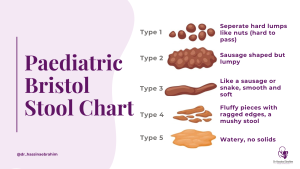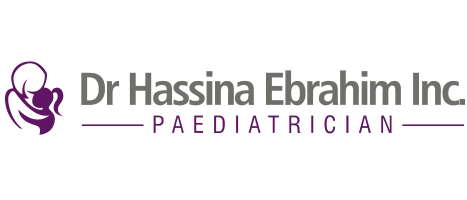05 Jun Understanding and Managing Constipation in Children: A Comprehensive Guide for Parents
By Dr. Hassina Ebrahim | 05 July 2025
Constipation is one of the most common digestive complaints among children, yet it often goes undiagnosed or misunderstood. As a paediatrician, I frequently encounter parents concerned about their child’s bowel habits — and rightly so. Understanding the root causes, knowing what to look out for, and implementing the right strategies can make a world of difference.
What is Constipation?
Constipation in children is typically defined as having fewer than two bowel movements per week, with stools that are hard, dry, and difficult to pass. This often leads to discomfort and a feeling of incomplete evacuation. While each child is different, any consistent pattern of hard or painful stools should raise concern.
Interestingly, constipation is more common than many realize — about 1 in 20 children will visit a doctor for this issue.
What’s Normal?
Bowel habits vary with age and diet:
– Newborns may pass up to four soft or liquid stools per day.
– Breastfed infants can have a stool after each feed or just once a week — both can be normal.
– Formula-fed infants usually have 2–3 bowel movements daily.
– Toddlers and young children tend to have 1–2 formed stools per day by the age of four.

Causes of Constipation
Constipation rarely stems from a single issue. Common contributing factors include:
Dietary Habits
– Low fibre intake
– Excess dairy or processed food
– Inadequate fluid intake
Lifestyle and Behaviour
– Toilet training stress or withholding stools
– Avoidance of public restrooms
– Reduced physical activity
– Routine changes (e.g., school start, travel)
Psychological Factors
– Anxiety
– Power struggles during potty training
Medical Conditions
– Hirschsprung’s disease
– Hypothyroidism
– Celiac disease
– Cow’s milk allergy
– Spinal cord abnormalities
– Side effects from medication
Functional Constipation: The Most Common Type
In most cases, constipation is “functional” — meaning there’s no underlying disease. The child may begin withholding stool due to a previous painful experience, leading to a vicious cycle:
1. Stool is held
2. It becomes harder and more painful to pass
3. Defecation becomes distressing
4. The child withholds again
5. Stool builds up, causing overflow or even soiling (incontinence)
Recognizing Severe Constipation
Severe cases may lead to faecal impaction. Symptoms include:
– A swollen tummy
– Excessive gas
– Poor appetite
– Passing only small bits of stool or none at all
Medical Evaluation
Your doctor may evaluate:
– Frequency and consistency of stools
– Pain or bloating
– Physical examination (especially of the abdomen)
– X-rays or blood tests (in complex cases)
Treatment Overview
Clean-Out Phase
In cases of faecal impaction, a “clean out” may be needed using:
– Oral laxatives like PEG (e.g., Pegicol)
– Enemas or suppositories
Maintenance Phase
Post-clean-out, ongoing treatment includes:
– Daily laxatives to maintain soft, regular stools
– Target: One soft stool per day
Lifestyle & Behavioural Support
– Encourage toilet time after meals (10 minutes, 2–3 times daily)
– Use incentives to build positive habits
– Track bowel movements, food intake, accidents, and medication use
Nutrition Tips :
– Increase fibre: whole grains, legumes, fruits, and vegetables
– Drink more water
– Replace refined grains with whole grains
– Serve fruit and vegetables at every meal and snack
Physical Activity Guidelines
– Under 5 years: At least 180 minutes/day, less than 1 hour screen time
– Over 5 years: At least 60 minutes of activity, less than 2 hours screen time
Let’s Support Healthy Little Tummies Together
Constipation can significantly affect a child’s well-being, but with the right guidance and a proactive approach, it is entirely manageable. For personalised support, reach out to my practice.
Life Roseacres Hospital – Room 2, Ground Floor
Call: 011 842 7626 | WhatsApp: 071 621 1332



